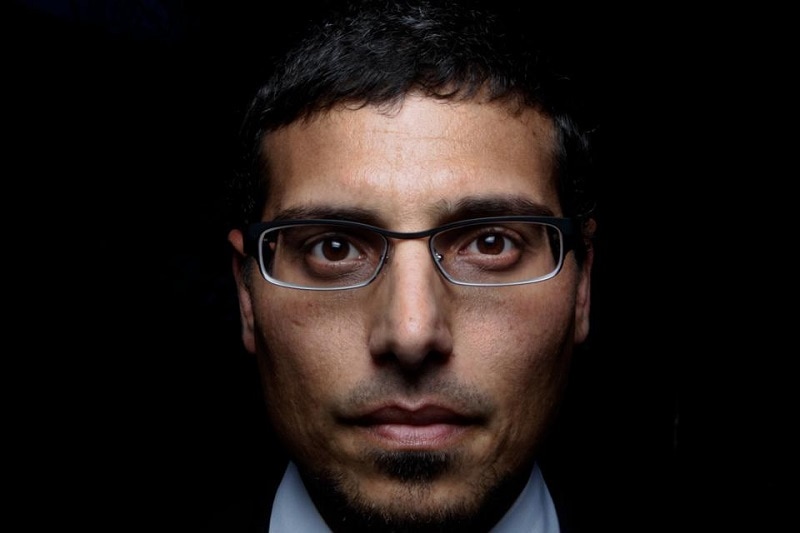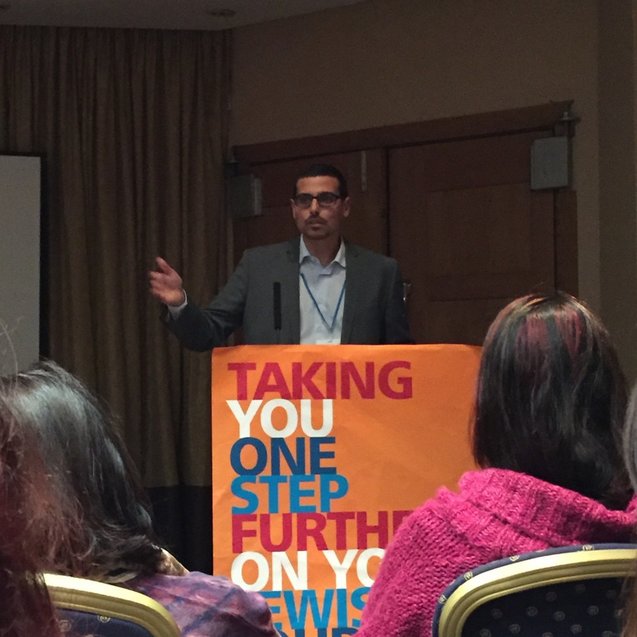Manny Waks: 'My life is not what it was'
Jewish News
Francine Wolfisz
11 May 2017

The Australian child sex abuse survivor speaks about his recently published memoir, Who Gave You Permission?
"My life is not what it was. I had a comfortable job, a serene life, I was involved communally. Things were going very well. Then this happened and it changed my world.”
Three decades may have passed, but Manny Waks, now 41, admits not a day goes by without acknowledging the sexual abuse he suffered as a child.
Raised in a strictly-Orthodox Jewish home in Melbourne, the second oldest of 17 children was betrayed by two men trusted by his family.
For years, Waks resisted telling anyone, but in 2011 he went public about his experiences in an attempt to bring his abusers to justice.
That testimony was more explosive than he imagined: it became the catalyst for an Orthodox sex abuse scandal that rocked Australia and resulted in the conviction of several men for sexually abusing boys during the 1980s and 1990s.
It led to a high-profile government inquiry and the resignation of several senior Chabad rabbis. Waks’ reward for speaking out was not one of praise, however, but rather intimidation and alienation by his community.
He was forced to leave his home and profession and the issue drove a wedge between his parents and family.
There’s no doubt the sacrifice has been huge, but one he feels “absolutely needed to be done”, having now dedicated his life to pursuing justice for fellow victims around the globe, as well as advocating change to prevent future child abuse.
Now his heart-rending experience, as well as his powerful journey towards becoming a victim advocate, is laid bare in his recently-published memoir, Who Gave You Permission?
Waks begins by describing life at his East St Kilda home, where parents Zephaniah and Chaya raised a brood of 11 boys and six girls.
“There was certainly never a dull moment,” he quips. “I always felt safe and loved, I didn’t feel any inadequacies. I remember going on weekend outings to the park and doing all those fun things.
"My life is not what it was. I had a comfortable job, a serene life, I was involved communally. Things were going very well. Then this happened and it changed my world.”
Three decades may have passed, but Manny Waks, now 41, admits not a day goes by without acknowledging the sexual abuse he suffered as a child.
Raised in a strictly-Orthodox Jewish home in Melbourne, the second oldest of 17 children was betrayed by two men trusted by his family.
For years, Waks resisted telling anyone, but in 2011 he went public about his experiences in an attempt to bring his abusers to justice.
That testimony was more explosive than he imagined: it became the catalyst for an Orthodox sex abuse scandal that rocked Australia and resulted in the conviction of several men for sexually abusing boys during the 1980s and 1990s.
It led to a high-profile government inquiry and the resignation of several senior Chabad rabbis. Waks’ reward for speaking out was not one of praise, however, but rather intimidation and alienation by his community.
He was forced to leave his home and profession and the issue drove a wedge between his parents and family.
There’s no doubt the sacrifice has been huge, but one he feels “absolutely needed to be done”, having now dedicated his life to pursuing justice for fellow victims around the globe, as well as advocating change to prevent future child abuse.
Now his heart-rending experience, as well as his powerful journey towards becoming a victim advocate, is laid bare in his recently-published memoir, Who Gave You Permission?
Waks begins by describing life at his East St Kilda home, where parents Zephaniah and Chaya raised a brood of 11 boys and six girls.
“There was certainly never a dull moment,” he quips. “I always felt safe and loved, I didn’t feel any inadequacies. I remember going on weekend outings to the park and doing all those fun things.
 Manny Waks speaking about his experiences at Limmud 2015
Manny Waks speaking about his experiences at Limmud 2015
“But in hindsight it is inevitable there would be deficiencies, because there is no way a parent can provide the love that a child really needs when you have so many children.
“In the context of child sexual abuse, there’s no doubt in my mind it’s a contributory factor. Child abuse victims come from all walks of life, but perpetrators will look for vulnerabilities.
“They will identify children they can manipulate and groom. Parents with many children struggle to know where their child is at all times.
“In a time when such things were not discussed, it’s like giving children on a silver platter to these abusers, who would be roaming synagogues, mikvehs and youth groups, waiting for any opportunity. But in synagogue, parents believe you can trust your fellow Jew.”
Waks, who now lives in Israel with his wife and three children, recalls the first time he was abused, aged 11.
He had felt tired during a Shavuot evening service at his synagogue and decided to retire to the ladies’ section, where another young boy was also sleeping.
But community member Velvel Serebryanski, who was in his 20s at the time, followed him upstairs.
“He had already been grooming me for a while. I was getting love, attention, special treats from him… but when he started following me upstairs, I realised something was wrong. I decided to pretend I was asleep, but when he touched me, I just froze.”
The abuse continued for six months until Waks “made it clear I didn’t want anything to do with him”. But the vulnerable youngster was again preyed upon as a teenager, this time by David Cyprys, a security guard at Melbourne’s Yeshiva College.
Waks says his abuser subjected him to “humiliating, controlling, degrading things”, including one incident inside a mikveh.
In 2013, Cyprys was found guilty of raping a 15-year-old boy and molesting eight boys, aged seven to 14, in the 1980s and 1990s, largely as a result of Waks speaking out about what had happened decades earlier.
The conviction came at a time when Waks was just personally coming to terms with the impact of being sexually abused as a child.
“I knew at the time it was wrong and confusing, but the sexual abuse was only something I realised years later.”
Other ramifications followed, including the Chabad community turning on him as a mesirah or informant, and his family were shunned.
Waks was angry the community supported the abusers rather than the victims and, in some cases, protected them despite knowing of their crimes.
And the divisions rumbled deeper. His mother, born and brought up as Chabad, was “extremely uncomfortable” with accusations of quiet acquiescence against the community.
While she has remained within it, his father has left. “He’s turned on Chabad completely, he has trimmed his beard and refers to them as a cult.”
For Waks, the side effects of what happened to him are still becoming apparent and he sees a therapist four times a week.
“The negative side is all-consuming and on a daily basis. I have dealt with feelings of depression, anxiety, feelings of suicide and relationship issues,” he says.
“The price my family and I have paid, and may forever pay, sometimes becomes very difficult and impossible to bear.”
Becoming a victim advocate was not something on his original agenda, but one at which he has nevertheless been successful.
He is the founder of Tzedek, an Australian organisation fighting child sexual abuse in Jewish communities, and Kol v’Oz, a group lobbying the Knesset for changes to the statute of limitations on sexual crimes.
“There have been significant changes in attitude, culture and in the desire to address this issue, both for injustices of the past, as well as for prevention in the future,” Waks tells me.
“It will take a generational change for this issue to be fully addressed and a full day working on this can be draining.
“But I will continue to do this for as long as I can. If I walk away now, it will be a massive step backwards for the Jewish community.”
Who Gave You Permission? The Memoir of a Child Sexual Abuse Survivor Who Fought Back by Manny Waks with Michael Visontay is published by Scribe, priced £14.99. Available now.
Originally published at Jewish News.
Your browser does not support viewing this document. Click here to download the document.